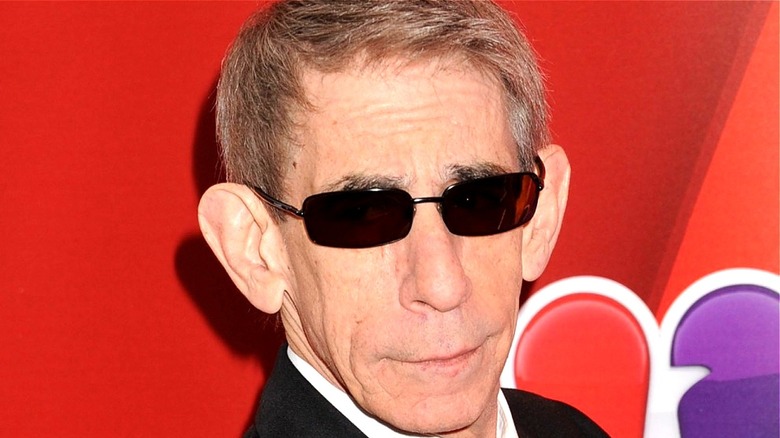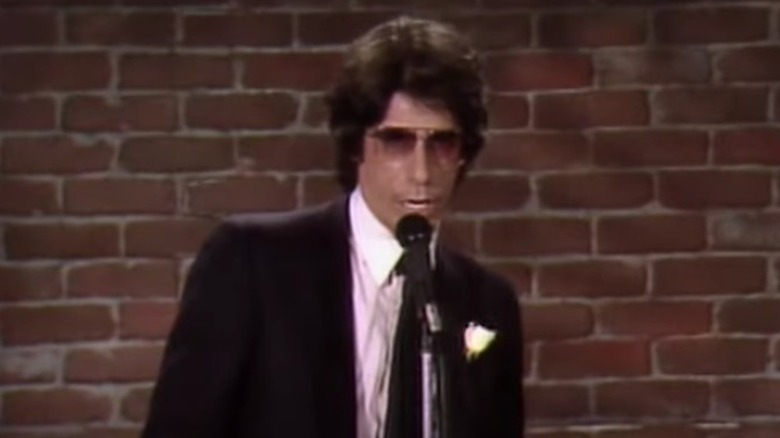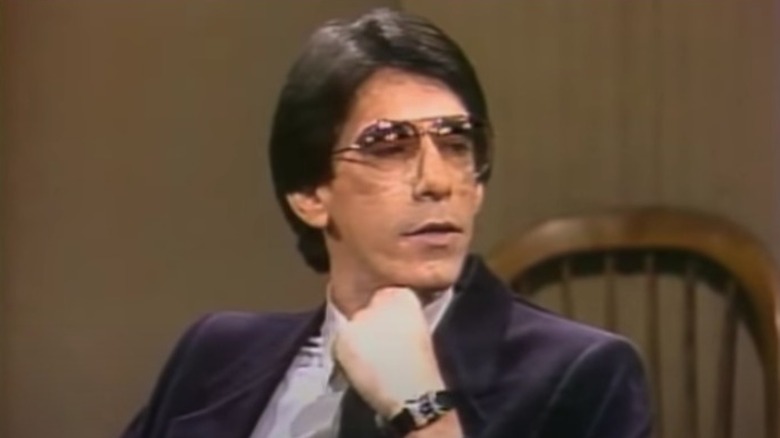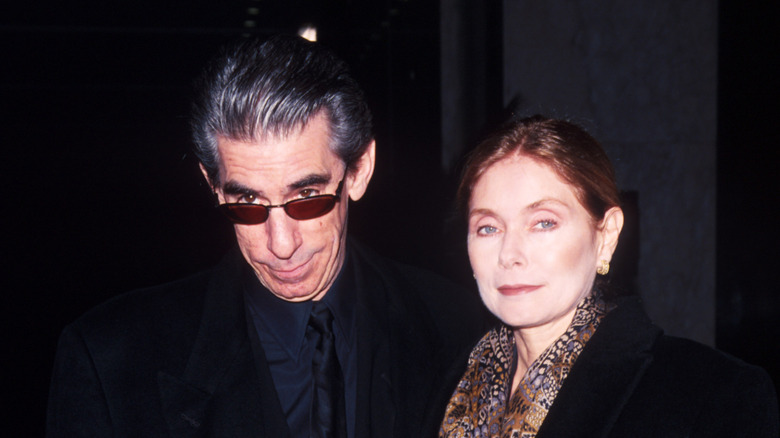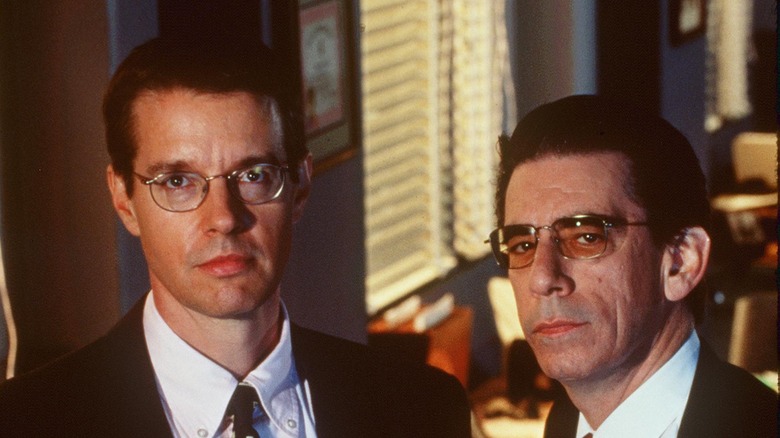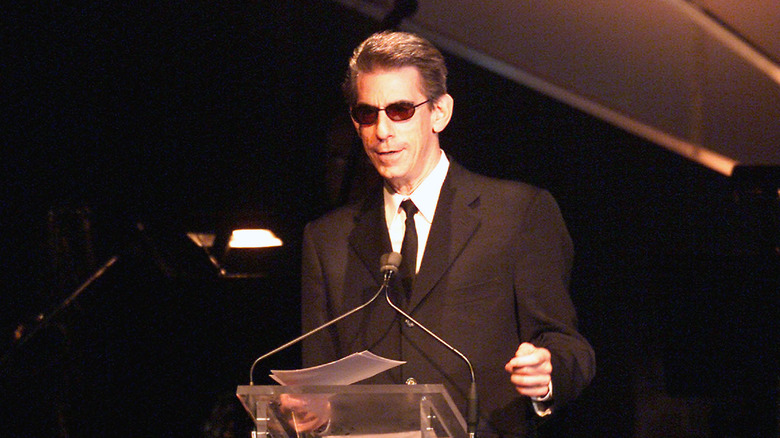The Transformation Of Richard Belzer From Childhood To Law And Order SVU
We may receive a commission on purchases made from links.
Even the most casual fan of "Law & Order: SVU" can't help but love Richard Belzer's Detective John Munch. As the anti-government, conspiracy-theory-happy partner of Ice-T's Detective Fin Tutuola, Munch provided a much-needed injection of levity, sarcasm, and wit to an otherwise exceptionally dark series. For over fifteen seasons (and 326 episodes, but who's counting?) the multiple times-over divorcé with a heart of gold acted as both the devil's and the everyman's advocate when it came to law enforcement's infringement on the individual liberties of both the suspect and the victim, often putting him at odds with his own department. Now in its 23rd season, it's difficult to watch the celebrated series and not feel a pang of nostalgia for Belzer's passionate and occasionally paranoid character.
Of course, the road to "SVU" super-stardom wasn't exactly easy. Before landing on Dick Wolf's most successful spin-off, Belzer overcame a difficult childhood, survived a not always rewarding career in stand-up, underwent treatment for cancer, and went through two divorces. While it's nearly impossible, in 2022, not to associate the Bridgeport, Connecticut native with (or even confuse him for) the celebrated NYC detective he played on TV for decades, the actor, writer, and producer's early career did little to suggest he'd eventually embody one of primetime's most recognizable characters.
Richard Belzer began his career as a stand-up comic
After successfully getting himself discharged from the Army during the tumultuous Vietnam War (via Fresh Air), Belzer threw himself into stand-up comedy, and it's not difficult to find the politically-aware, sarcastic Detective Munch that audiences have come to know in some of the actor's early bits. In his routines, Belzer joked frequently about his (and Bob Dylan's) Jewish heritage, put his resemblance to the lanky Mick Jagger to good use, and poked fun at Ronald Reagan's TV host background (via YouTube).
In a 1997 interview with Fresh Air's Terry Gross, Belzer revealed that, like so many comedians, his affinity for humor developed out of a need for protection. "My wit has saved me more than once," he told Gross, adding euphemistically, and with no small measure of dark humor, that his abusive mother was "the toughest audience [he] ever had." While he confessed that using comedy to quell his mother's anger didn't work quite as effectively as legend would suggest, he did rely heavily on his Jerry Lewis impression to make his mother laugh. By the time he was a young adult, Belzer was performing impressions and cracking jokes on stage, with unique routines that eventually landed him on Late Night television.
If you or someone you know may be the victim of child abuse, please contact the Childhelp National Child Abuse Hotline at 1-800-4-A-Child (1-800-422-4453) or contact their live chat services.
Belzer's comedy career began to take off in the early '80s
By the late 1970s and early 1980s, the man who would-be legendary Detective John Munch was well on his way to gaining fame in a different field entirely. His work as a co-host on WNBC radio's "Brink & Belzer" program introduced him to a wider audience, and brought him to the attention of David Letterman, who called him "one of the most inventive stand-up comics in the business today" during his 1982 introduction of the comic (via YouTube). Belzer would appear numerous times on "Late Night with David Letterman," often coming out to The Rolling Stones' "Start Me Up" — a nod to his infamous and unnervingly spot-on impersonation of Jagger (via YouTube).
At the time of his first appearance on the show, the comedian and radio host had already made three appearances on "Saturday Night Live," and had just wrapped production on writer Israel Horovitz's and director Arthur Hiller's "Author! Author!," a comedy starring Al Pacino (via IMDb). Despite his success, as an interview in People magazine reveals, Belzer was still (at least financially speaking, and in comparison to heavy hitters like Chevy Chase and Steve Martin) a "working-class comedian," — one who had to, in his words, "sell out" by appearing on an embarrassing cable game show in order to pay for a vacation. Thankfully, though Belzer had yet to achieve the kind of notoriety that was waiting for him just around the corner, things were going slightly better in his personal life.
Unlike his TV alter ego, Belzer was only divorced twice
Art may imitate life when it comes to Belzer's and Munch's thoughts on The Constitution, surveillance, politics, and conspiracy theories, but with regard to the two men's respective love lives, it's safe to say the actor has faired a great deal better than his unlucky-in-love counterpart. As viewers learn early on in "SVU," John Munch has been divorced four times, and is on relatively good terms with just one of his ex-wives — Carol Kane's increasingly paranoid Gwen Munch, who first makes an appearance in Season 10's "Zebras" (via IMDb).
Unlike Munch, Belzer went through just two divorces before marrying his current wife, actor and producer Harlee McBride, in 1985. The actor married his first wife, Gail Susan Ross, in 1966, and the two were wed for six years before divorcing in 1972. Belzer and his second wife, Dalia Danoch, were married for just two years, from 1976 to 1978 (via Film Reference).
McBride and Belzer met on a blind date in 1981, and the two married four years later, following the actor's diagnoses of and treatment for testicular cancer. Of his experience with the disease, Belzer told People that the "cosmic slap in the face" inspired him to stop his drug use, while McBride told the outlet that the actor and step-father of her two children from her first marriage (to former actor Garth Benton), "softened" her, adding that "marriage relaxed (Belzer) too." To-date, the couple have happily married for 37 years — a longevity to which John Munch never came remotely close.
Belzer went from comedian to cop with Homicide: Life on the Street
Nine years into their marriage, Belzer and McBride would find themselves co-starring in the series that introduced Detective John Munch to television viewers everywhere: no, not "SVU" (not even "Law & Order"), but creators Barry Levinson and Paul Attanasio's "Homicide: Life on the Street." The NBC series, a gritty police procedural based on David Simon's book about the Baltimore police department's homicide unit, marked a major transition for the actor. In 1993, Belzer was mainly known for his stand-up/comedic appearances, and for his recurring role as reporter Joe Kline in Danny Bilson and Paul De Meo's short-lived (later rebooted) "The Flash" (via IMDb). Belzer may not have foreseen the lasting impact his wise-cracking detective would have on police procedural history, but Levinson had at least an inkling.
As the director and creator told People in 1993, Belzer's hip comedic delivery combined and politically relevant subject matter inspired Levinson to take a chance on the actor. "I heard him on the Howard Stern show," Levinson explained, "and he wasn't just telling jokes. He was smart, and he had an attitude...I wondered if I could...put it into the Munch character." The gamble paid off, and Levinson was impressed with Belzer's acting from the start. As he told the outlet, "a lot of comics who go into acting kind of do it winking at the camera. But Richard's in there doing it as an actor." Decades later, the Belzer-inspired, Belzer-portrayed character has starred in a variety of series, sometimes showing up on different networks. In 1994, a not-yet-paranoid Munch laughed-off Agent Mulder's (David Duchovny) statement in an episode of Fox's "The X-Files," implying that it was the paranormal detective who first incited Munch's later paranoia and government skepticism.
Detective Munch isn't the only one with theories
Before Dick Wolf made the successful decision to bring back Belzer's well-known, off-beat detective with the launch of "Law & Order: SVU," the comedian and actor was blurring the line between his TV persona and his own with his second book, "UFOs, JFK & Elvis: Conspiracies You Don't Have to Be Crazy to Believe." In the "SVU" pilot, Munch goes on at length about the mountain of evidence he believes proves that the government was behind the assassination of JFK — a theory Belzer had just written about, and upon which he prefaces his book.
"Since the publication of this book," he writes, "I've been hailed as a whistle-blower and pilloried as a paranoid. But however people react to me as a truth-seeker and assassination theorist, the evidence that President John Fitzgerald Kennedy was the victim of a conspiracy just keeps floating to the surface" (via Amazon). The book, written with the same sarcastic swagger with which Belzer approached both his stand-up and his famously wry character, may not have impressed the "stay in your lane" critics (via Publishers Weekly), but based on its Amazon reader rating, it succeeded as a tool for satisfying both conspiracy lovers and his built-in fan base — a base that was about to grow exponentially. The book was first published in May of 1999, just months before the September series premiere of "SVU." Whether or not Belzer was successful in closing the case on Kennedy, it's clear he was no shlub, as Munch would say, when it came to using his real-life similarities to the beloved TV detective as a brilliant marketing tool.
